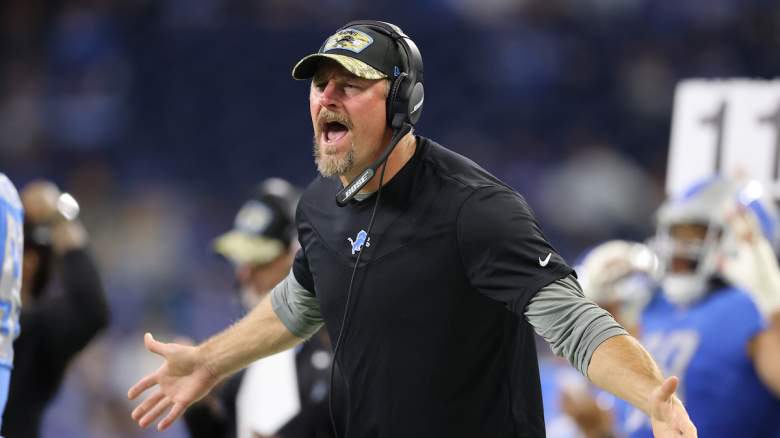
Getty
It’s safe to say Detroit Lions head coach Dan Campbell doesn’t like the new NFL kickoff rule. He doesn’t like even a little bit.
“I’m highly frustrated. It’s very frustrating,” Campbell told the media when asked about the new rule at OTA practices. “But look, I don’t make the rules. That’s the new rule and then we’ll live by the new rule. We’ll find a way to adjust, adapt, and still get what we want.
“That’s what you’ve got to do. But I hate that we continue to take away from the game.”
NFL owners voted on May 23 to approve a new rule that allows the receiving team on kickoffs to call a fair catch wherever they are on the field.
The fair catch will result in the receiving team’s offense beginning its next drive at the 25-yard line or on the yard line where the fair catch is made (whichever is better for the offense).
Chair of the NFL’s competition committee Rich McKay shared on NFL Network that player safety is the reason for the rule change. McKay and NFL executive Jeff Miller said their research data on kickoffs indicates the concussion rate will drop 15% because of the new rule.
The league agreed to install the rule for only the 2023 season.
Lions’ Dan Campbell Says NFL Continues to ‘Bleed This League’ Dry
The modern NFL must constantly toe the line between keeping its game exciting while also making it safer for the players. But Campbell clearly stated that this latest rule change in an effort to cut down on concussion goes too far.
“That’s what really worries me, that we just, we continue to bleed this league [dry],” Campbell said. “If we’re not careful, it’s not going to replenish at one point.”
Campbell continued, saying again that his team and coaching staff will “make do” and “adjust” but obviously, he was not pleased with the new rule.
College football adopted the same fair catch rule for player safety in 2018, so it’s not a completely revolutionary rule.
In 2016, the NFL made a different rule change in an effort to cut down on kickoff returns by moving the offense’s starting point after a touchback from the 20 to the 25-yard line. But McKay argued that that new rule had somewhat of the opposite impact the league intended.
Instead of kickers launching the ball into the end zone and returners downing the ball for touchbacks, kickers have often opted for shorter, higher kicks in front of the goal line. The strategy has worked for special teams unit that have good coverage and can tackle the returner before he reaches the 25-yard line.
Allowing a returner to make a fair catch anywhere eliminates that strategy entirely. Based on McKay’s data, it’s a better way to cut down on returns, and thus, concussions.
Lions Special Teams Coordinator Dave Fipp Defends NFL’s New Kickoff Rule
Campbell seemed to imply, as others have around the NFL (especially players and coaches from the Kansas City Chiefs), that the league is slowly taking special teams out of the game. Lions special teams coordinator Dave Fipp, though, pushed back on that narrative.
“Honestly, I don’t think it’s going to change the game a whole lot, so I’m different than some of these people,” Fipp told the media at OTAs. “I think what the numbers say is the shorter the kick or the further out it is for the return team — like the 10-yard line. If the ball is kicked to the 10, I think the data says you should return it.
“So I think we’re still going to see a lot of returns.”
Fipp continued to compliment the league for its effort to make the game safer and made clear that he doesn’t think there’s an alternative motive to eliminate special teams. He also said it’s his job to make his unit the best it can be within the set rules.
“I don’t think that’s what they’re trying to do (eliminate special teams). I think they’re trying to make the game safer.”
According to McKay, the NFL can expect to see the return rate decrease from 38% to 31% with the new fair catch rule.
Based on that information, there will be a decline in returns, but Fipp is correct. The change, over the course of an entire season, may be minimal.
Comments
Lions’ Dan Campbell Blasts New NFL Rule